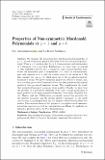Properties of Non-symmetric Macdonald Polynomials at $$q=1$$ q = 1 and $$q=0$$ q = 0
Author(s)
Alexandersson, Per; Sawhney, Mehtaab
Download26_2019_Article_432.pdf (513.3Kb)
Publisher with Creative Commons License
Publisher with Creative Commons License
Creative Commons Attribution
Terms of use
Metadata
Show full item recordAbstract
Abstract
We examine the non-symmetric Macdonald polynomials
$$\mathrm {E}_\lambda $$
E
λ
at
$$q=1$$
q
=
1
, as well as the more general permuted-basement Macdonald polynomials. When
$$q=1$$
q
=
1
, we show that
$$\mathrm {E}_\lambda (\mathbf {x};1,t)$$
E
λ
(
x
;
1
,
t
)
is symmetric and independent of t whenever
$$\lambda $$
λ
is a partition. Furthermore, we show that, in general
$$\lambda $$
λ
, this expression factors into a symmetric and a non-symmetric part, where the symmetric part is independent of t, and the non-symmetric part only depends on
$$\mathbf {x}$$
x
, t, and the relative order of the entries in
$$\lambda $$
λ
. We also examine the case
$$q=0$$
q
=
0
, which gives rise to the so-called permuted-basement t-atoms. We prove expansion properties of these t-atoms, and, as a corollary, prove that Demazure characters (key polynomials) expand positively into permuted-basement atoms. This complements the result that permuted-basement atoms are atom-positive. Finally, we show that the product of a permuted-basement atom and a Schur polynomial is again positive in the same permuted-basement atom basis. Haglund, Luoto, Mason, and van Willigenburg previously proved this property for the identity basement and the reverse identity basement, so our result can be seen as an interpolation (in the Bruhat order) between these two results. The common theme in this project is the application of basement-permuting operators as well as combinatorics on fillings, by applying results in a previous article by Per Alexandersson.
Date issued
2019-05-11Department
Massachusetts Institute of Technology. Department of MathematicsPublisher
Springer International Publishing